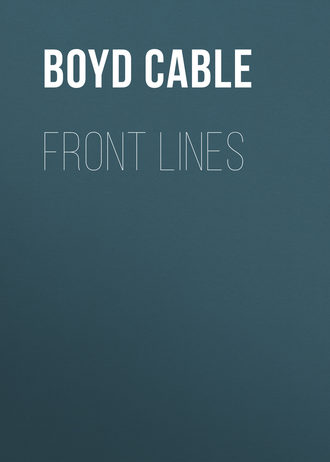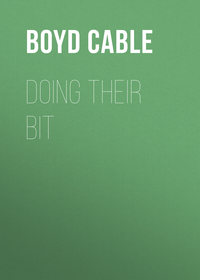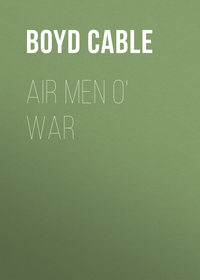
Front Lines
“Please yerself,” returned the sergeant. “My job’s to keep pumpin’ ’em down ’is throat every time ’e opens ’is mouth.”
“Watch you don’t plug me in mistake when I get there,” said Jake, and crawled out of the hole. He ducked hastily into another as he heard the enemy bullets spatter about him, shift and begin to smack and splash about the gun he had just left. That gun ceased fire suddenly, but the one fifty yards farther round kept on furiously. “Got him in the neck, I s’pose,” said Jake, “worse luck.”
He had a couple of Mills’ bombs in his pockets, but added to his stock from a half-empty bucket he found lying by a dead bomber in a crater. He advanced cautiously, wriggling hurriedly over the dividing ground between craters, keeping down under cover as much as possible, working out and then sidling in towards the red flashes that kept spurting out at intervals from the emplacement. Once it seemed that the enemy gunners had spotted him as he crawled and wriggled from one hole to another, and a gust of bullets came suddenly ripping and whipping about him as he hurled himself forward and plunged head foremost into a crater with his left side tingling and blood trickling from his left arm. He fingered the rent in his tunic and satisfied himself that the side wound was no more than a graze, the arm one a clean perforation which did not appear to have touched the bone. Twice after that he heard the bullets’ swish-ish-ish sweeping over his head, or dropping to spatter the dirt flying from the edge of a hole he had reached. But he worked steadily on all the same, passed the line of the front and side embrasures, and was pondering his next move, when a sudden rapid outburst of fire made him lift his head and peer out. A dozen men had appeared suddenly within twenty yards of the emplacement and were making as rapid a dash for it as the ground allowed. The machine-guns were hailing bullets at them as hard as they could fire, and man after man plunged and fell and rolled and squirmed into holes or lay still in the open.
Jake did not wait to see the result of the dash. He was up and out of his cover and running in himself as fast as the wet ground would allow him. He was almost on the emplacement when a gun slewed round and banged a short burst at him. He felt the rush of bullets past his face, a pluck at his sleeve and shoulder strap, a blow on his shrapnel helmet, made a last desperate plunge forward, and scrambled on to the low roof. Hurriedly he pulled a bomb from his pocket and jerked the pin out, when a couple of rifles banged close behind them, a bullet whipped past overhead, and another smacked and ricochetted screaming from the concrete. Jake twisted, saw the head and shoulders of two men with rifles levelled over a hole, and quick as a flash hurled his bomb. The men ducked, and Jake drew the pin from another bomb and lobbed it carefully over just as the first bomb burst. The other followed, exploding fairly in the hole and evidently deep down since the report was low and muffled. Jake pulled another pin, and was leaning over to locate an embrasure when the gun flamed out from it. Jake released the spring, counted carefully “One and two and three and – ” leaned over and slammed the bomb fairly into the slit. He had another bomb out as it burst – well inside by the sound of it – and this time leaned over and deliberately thrust it in through the opening. He had barely snatched his hand out when it went off with a muffled crash. Jake heard screams inside, and then an instant later loud calls behind him. He jerked round to see half a dozen arms waving from the hole where he had flung the first bomb. This, as he found after, was the underground stair down and up again into the emplacement, and the waving arms were in token of the garrison’s surrender.
Jake stood on the roof and waved his arm, while keeping a cautious eye on the surrenderers, saw the mud-daubed khaki figures rise from their holes and come scrambling forward, and sat down suddenly, feeling unpleasantly faint and sickish.
His officer’s voice recalled him. “Well done, lad, well done. This cursed thing was fairly holding us up till you scuppered it. We’ve got our objective line now.”
Jake staggered to his feet.
“You’re wounded,” went on the officer. “Get back out of this, and give a message to anyone that’ll take it, that we’ve got our third objective line, and want supports and ammunition quick as possible. Go on, off with you, now.”
“Right, sir!” said Jake with an effort, and started off back across the shell-torn ground again.
He felt a bit dizzy still – side hurt a heap – arm getting numb, too – must keep going and get that message through —
A high-explosive shrapnel burst directly overhead, and Jake heard several small pieces whip-down and one heavy bit splash thudding into the ground a yard from his feet. And this was only the first shell of many. The Germans had seen that their ground was lost, and were beginning to barrage it. Jake staggered blindly across the broken ground, in and out and round the craters, over sodden mounds that caught at his feet and crumbled wetly under his tread. Huge clods of wet earth clung to his feet and legs and made every step an effort. The shell fire was growing more and more intense, thundering and crashing and hurling cascades of mud and splinters in every direction, passing overhead in long-drawn howls and moans and yellings, or the short savage screams and rush of the nearer passing. The ground was veiled in smoke and drifting haze, and stretched as far as he could see in a dreary perspective of shiny wet earth and ragged holes. He felt that he’d never cover it, never get clear of these cursed – what were they – shells, bogies, demons screaming and howling for his life. He plunged into a patch of low-lying ground, sticky swamp that sank him knee deep at every step, that clutched and clung about his feet and held each foot gripped as he dragged it sucking out and swung it forward. He wanted to run – run – run – but his legs were lead – and the bogies were very close – and now there were dead men amongst his feet – horribly mud-bedaubed dead, half-buried in the ooze – and helmets, and scattered packs, and haversacks. A festering stench rose from the slime he waded through. He tried again to run, but could only stagger slowly, dragging one foot clear after the other. Once he trod on something he thought a lump of drier mud, and it squirmed weakly under his foot, and a white face twisted round and up, mouthing feeble curses at him. There were other things, horrible things he turned his eyes from as he tried to hurry past – and red stains on the frothy green scum. He reeled on, stupid and dazed, with the thunderous crashes of a world shattering and dissolving about him, deafened by the demon screeches and howlings. There were other people with him, some wandering aimlessly, others going direct the one way, meeting still others going the opposite, but all dragging clogged, weighted feet. Some fell and did not rise. Jake knew they had been caught. He saw two men who were carrying something, a stretcher, stop and look up, and lower the stretcher hastily and drop, one flat on his face, the other crouched low and still looking up. A spurt of red flame flung a rolling cloud of black smoke about them, and seconds after a flattened steel helmet whistled down out of the sky and thudded in the mud by Jake. When he came to where they had been there was only a hole with blue and grey reek curling slowly up its black calcined sides. Jake knew the three had been caught, too – as he would be caught, if he didn’t hurry. He struggled, panting.
They were still yelling and howling, looking for him. Demons, bogymen – and here was the loudest, and fiercest, the worst of them all – louder and louder to a tremendous chorus of all the noises devils ever made. He was flinging himself down to escape the demon clutch (thereby probably saving his life, since the great shell burst a bare score yards away) when he heard the thunderous clash of the furnace-doors flung back, caught a searing glimpse of the leaping red flames, and was hurled headlong.
As he fell he tried to scream. He did scream, but – although he knew nothing of the gap, and thought it was on the instant of his falling – it was days later – a queer choking, strangled cry that brought a cool hand on his hot forehead, a quiet voice hushing and soothing him and saying he was “all right now.”
He opened his eyes and closed them again with a sigh of relief and content. A low light was burning by his bed, the shadowy figure of a woman bent over him, and between the opening and closing of his eyes, his mind flicked back to full fifteen years.
“I’m glad I waked, Nursie,” he said weakly. “I’ve had a drefful dream; the very dreffulest I’ve ever had.”
IX
THE GILDED STAFF
A TALE OF THE OLD CONTEMPTIBLES
Broadly speaking, the average regimental officer and man of the fighting units is firmly convinced beyond all argument that a “Staff job” is an absolutely safe and completely cushy2 one, that the Staff-wallah always has the best of food and drink, a good roof over him, and a soft bed to lie on, nothing to do except maybe sign his name to a few papers when he feels so inclined, and perhaps in a casual and comfortable chat after a good dinner decide on a tactical move, a strafe of some sort, issue the orders in a sort of brief “Take Hill 999” or “retire by Dead Cow Corner to Two Tree Trench” style, and leave the regiments concerned to carry on. Briefly, the opinion of the firing line might be summed up in a short Credo:
“I believe the Staff is No Good.
“I believe the Staff has the cushiest of cushy jobs.
“I believe the Staff never hears a bullet whistle or sees a shell burst except through a telescope.
“I believe the Staff exists solely to find soft jobs for the wealthy and useless portion of the aristocracy.
“I believe the Staff does nothing except wear a supercilious manner and red tabs and trimmings.
“I believe the Staff is No Good.”
As to the average of correctness in this Credo I say nothing, but I can at least show that these things are not always thus.
The Staff had been having what the General’s youthful and irrepressibly cheerful aide-de-camp called “a hectic three days.” The Headquarters signallers had been going hard night and day until one of them was driven to remark bitterly as he straightened his bent back from over his instrument and waggled his stiffened fingers that had been tapping the “buzzer” for hours on end, “I’m developin’ a permanent hump on my back like a dog scrapin’ a pot, an’ if my fingers isn’t to be wore off by inches I’ll have to get the farrier to put a set of shoes on ’em.” But the signallers had some advantages that the Staff hadn’t, and one was that they could arrange spells of duty and at least have a certain time off for rest and sleep. The Staff Captain would have given a good deal for that privilege by about the third night. The worst of his job was that he had no time when he could be sure of a clear ten minutes’ rest. He had messages brought to him as he devoured scratch meals; he was roused from such short sleeps as he could snatch lying fully dressed on a camp bed, by telephone and telegraph messages, or, still worse, by horrible scrawls badly written in faint pencillings that his weary eyes could barely decipher as he sat up on his bed with a pocket electric glaring on the paper; once he even had to abandon an attempt to shave, wipe the lather from his face, and hustle to impart some information to a waiting General. A very hot fight was raging along that portion of front, and almost every report from the firing line contained many map references which necessitated so many huntings of obscure points on the maps that the mere reading and understanding of a message might take a full five or ten minutes; and in the same way the finding of regiments’ positions for the General’s information or the sending of orders added ten-fold to the map-hunting.
The third day was about the most “hectic” of all. For the Captain it began before daybreak with a call to the telephone which came just two hours after he had shuffled and shaken together the papers he had been working on without a break through the night, pulled off his boots, blown out his lamp, and dropped with a sigh of relief on his bed in a corner of the room. It was an urgent and personal call, and the first dozen words effectually drove the lingering sleep from the Captain’s eyes and brain. “Yes, yes, ‘heavily attacked,’ I got that; go on … no, I don’t think I need to refer to the map; I very nearly know the beastly thing by heart now … yes … yes … Who? … killed outright … that’s bad… Who’s in command now then … right. The Dee and Don Trenches – wait a minute, which are they? Oh yes, I remember, south from the Pigsty and across to Stink Farm … right. I’ll pass it on at once and let you know in five minutes … just repeat map references so I can make a note … yes … yes … yes
… right … ’Bye.”
The urgency of the message, which told of a heavy and partially successful attack on the Divisional Front, wiped out any hope the Captain might have had of a return to his broken sleep. For the next two hours his mind was kept at full stretch reducing to elaborated details the comprehensive commands of the General, locating reserves and supports and Battalion H.Q.s, exchanging long messages with the Artillery, collecting figures of ammunition states, available strengths, casualty returns, collating and sifting them out, reshuffling them and offering them up to the Brigade Major or the General, absorbing or distributing messages from and to concrete personalities or nebulous authorities known widely if vaguely as the D.A.A.G., D.A.Q.M.G., D.A.D.O.S., A.D.M.S., C.D.S., and T., and other strings of jumbled initials.
He washed in the sparing dimensions of a canvas wash-stand, Field Service, x Pattern, deliberately taking off his coat and rolling up his shirt-sleeves, and firmly turning a deaf and soap-filled ear to the orderly who placed a ruled telephone message form on his table and announced it urgent. Afterwards he attended to the message, and talked into the telephone while his servant cleared one side of his table and served plentiful bacon, and eggs of an unknown period. Immediately after this a concentrated bombardment suddenly developed on a ruined château some three or four hundred yards from the H.Q. farm. To the youthful aide-de-camp who had arrived from the outer dampness dripping water from every angle of a streaming mackintosh he remarked wrathfully on the prospect of having to move once again in the middle of such beastly waterfall weather. The aide stood at the brown-paper patched window, chuckling and watching the shells rewreck the already wrecked château. “Looks as if their spies had sold ’em a pup this time,” he said gleefully. “I believe they must have been told we were in that old ruin instead of here. Or they were told this place and mistook it on the map for the château. Rather a lark – what!”
“Confound the larks,” said the Captain bitterly, “especially if they come any nearer this way. This place is quite leaky and draughty enough now without it getting any more shrap or splinter holes punched in it.”
Here the Captain had a short break from his inside job, leaving another officer to look after that and accompanying the General on horseback to a conference with various Brigadiers, Colonels, and Commanding Officers. The ride was too wet to be pleasant, and at no time could a better pace than a jog trot be made because on the road there was too much horse, foot, and wheeled traffic, and off the road in the swimming fields it took the horses all their time to keep their feet.
The conference was held under the remaining quarter-roof of a shell-smashed farm, and the Captain listened and made notes in a damp book, afterwards accompanying the General on a ride round to where something could be seen of the position, and back to H.Q. Here, under the General’s direction in consultation with the Brigade Major, he elaborated and extended his notes, drafted detailed directions for a number of minor moves next day, and translated them into terms of map-reference language, and a multitude of details of roads to be followed by different units, billeting areas, rationing, and refilling points, and so on.
He made a hasty, tinned lunch, and at the General’s request set out to find one of the Battalion Headquarters and there meet some C.O.s and make clear to them certain points of the dispositions arranged. He went in a motor, sped on his way by the cheerful information of the aide that the town through which he must pass had been under “a deuce of a hot fire” all day, had its streets full of Jack Johnson holes, and was in a continual state of blowing up, falling down, or being burnt out. “I was through there this morning,” said the aide, “and I tell you it was warmish. Sentry outside on the road wanted to stop me at first; said he’d orders to warn everybody it wasn’t safe. Wasn’t safe,” repeated the youth, chuckling, “Lord, after I’d been through there I’d have given that sentry any sort of a certificate of truthfulness. It was not safe.”
The Captain went off with his motor skating from ditch to ditch down the greasy road. The guns were rumbling and banging up in front, and as the car bumped and slithered nearer to the town the Captain could hear the long yelling whistle and the deep rolling crashes of heavy shells falling somewhere in it. He too was stopped at the outskirts by a sentry who held up his hand to the driver, and then came and parleyed with the Captain through the window. The Captain impatiently cut his warning short. There was no other road that would take him near the point he desired to reach; he must go through the town; he must ride since he could not spare time to walk. He climbed out and mounted beside the driver, with some instinctive and vaguely formed ideas in his mind that if the driver were hit he might have to take the wheel, that the car might be upset and pin him underneath, that he might be able to assist in picking a course through rubbish and shell-holes, to jump out and clear any slight obstruction from in front of the wheels. The car ran on slowly into the town. Decidedly the aide had been right, except that “warmish” was a mild word for the state of affairs. The Germans were flinging shells into the town as if they meant to destroy it utterly. The main street through was littered with bricks and tiles and broken furniture; dead horses were sprawled in it, some limp and new killed with the blood still running from their wounds, others with their four legs sticking out post-stiff in the air; in several places there were broken-down carts, in one place a regular mass of them piled up and locked in a confused tangle of broken wheels, splintered shafts, cut harness, and smashed woodwork, their contents spilled out anyhow and mixed up inextricably with the wreckage.
There was not much traffic in the main street, and such as was there was evidently, like the Captain himself, only there because no other road offered. There were half a dozen artillery ammunition waggons, a few infantry transport carts, several Army Service Corps vehicles. All of them were moving at a trot, the waggons rumbling and lumbering heavily and noisily over the cobblestones, the drivers stooped forward and peering out anxiously to pick a way between the obstacles in their path. The shells were coming over continuously, moaning and howling and yelling, falling with tearing crashes amongst the houses, blowing them wall from wall, slicing corners off or cutting a complete top or end away, breaking them down in rattling cascades of tiles and bricks, bursting them open and flinging them high and far upwards and outwards in flying fragments. As the car crawled cautiously through the debris that littered the street, pieces of brick and mortar, whole or broken slates, chips of wood and stone, pattered and rapped constantly down about and on the car; the wheels crunched and ground on splintered glass from the gaping windows. A shell roared down on the street ahead of them, burst thunderously in a vivid sheet of flame and spurting black cloud of smoke, an appalling crash that rolled and reverberated loud and long up and down the narrow street. “Go easy,” cautioned the Captain as the black blinding reek came swirling down to meet them, “or you’ll run into the hole that fellow made.” The driver’s face was set and white, and his hands gripped tight on the wheel; the Captain had a sudden compunction that he had brought him, that he had not left the car outside the town and walked through. They edged carefully past the yawning shell-crater with the smoke still clinging and curling up from its edges, and, free of the smoke again, saw a fairly clear stretch ahead of them. The Captain heard the thin but rising whistle of another heavy shell approaching, and “Open her out,” he said quickly, “and let her rip.” The driver, he noticed, for all his white face had his nerves well under control, and steadily caught the change of gear on the proper instant, speeded up sharply but quite smoothly. The car swooped down the clear stretch, the roar of the shell growing louder and closer, and just as they reached and crammed the brakes on to take the corner, they heard the shell crash down behind them. The Captain leaned out and looked back, and had a momentary glimpse of a house on the street spouting black smoke, dissolving and cascading down and out across the road in a torrent of bricks and wreckage. In another two minutes they shot out clear of the town. A mile farther on a soldier warned them that the cross-roads were practically impassable, the roadway being broken and churned up by the heavy shells that all afternoon had been and were still at intervals falling upon it. So the Captain left the car and went on a-foot. He was nearly caught at the cross-roads, a shell fragment ripping a huge rent in his mackintosh just over his ribs. Before he reached the communication trenches too he had a highly uncomfortable minute with light high-explosive shells bursting round him while he crouched low in a muddy shell-crater. He reached the meeting-place at last, and spent an hour talking over plans and movements, and by the time he was ready to start back it was rapidly growing dark. It was completely dark before he found his way back to the road again, stumbling over the shell-holed ground, slipping and floundering through the mud, tripping once and falling heavily over some strands of barbed wire. When he found the car again he was so dirty and draggled and dishevelled and ragged – the barbed wire had taken the cap from his head and dropped it in a mud puddle, and left another tear or two in his mackintosh – so smeared and plastered with mud, that his driver at first failed to recognise him. In the town he found parties of the Sappers filling up the worst of the shell-holes and clearing away the debris that blocked the road where he had seen the house blown down, while the shells still screamed up and burst clattering over and amongst the houses, and bullets and splinters whistled and sang overhead, clashed and rattled on the causeway.
He slept snatchily through the rest of the journey, waking many times as the car bumped badly, and once, when it dropped heavily into a shell-hole and bounced out again, flinging him bodily upwards until his head and shoulder banged solidly against the roof, taking half a minute to regain his scattered wits and dissipate a wild dream that the car had been fairly hit by a shell.
And when at last he reached H.Q., crawled wearily out of the car, and staggered, half asleep and utterly worn out, into his room, he found there the other officer he had left to handle his work and the youthful aide humped over the table copying out reports.
“Hullo,” said the senior, “you’re late. I say, you do look tucked up.”
The Captain grunted. “Not more’n I feel,” he said, blinking at the light. “Thank the Lord my job’s over and everything fixed and ready so far’s this end goes.”
“You’ve heard, I suppose!” said the other. “No? Baddish news. Our left has cracked and the Germ has a slice of their trenches. It upsets all our plans, and we’ve got ’em all to make over again.”
The Captain stared blankly at him. “All to make … that means all to-day’s work to begin and go through again. All to-day’s work – well, I’m …”
The aide had been eyeing the mud-bedaubed figure with water dripping from the torn coat, the sopping cap dangling in the dirty hand, the blue unshaven chin and red-rimmed eyes. He giggled suddenly. “I say, you know what the troops call the Staff?” He spluttered laughter. “The Gilded Staff,” he said, pointing at the Captain. “Behold – oh, my aunt – behold the Gilded Staff.”





